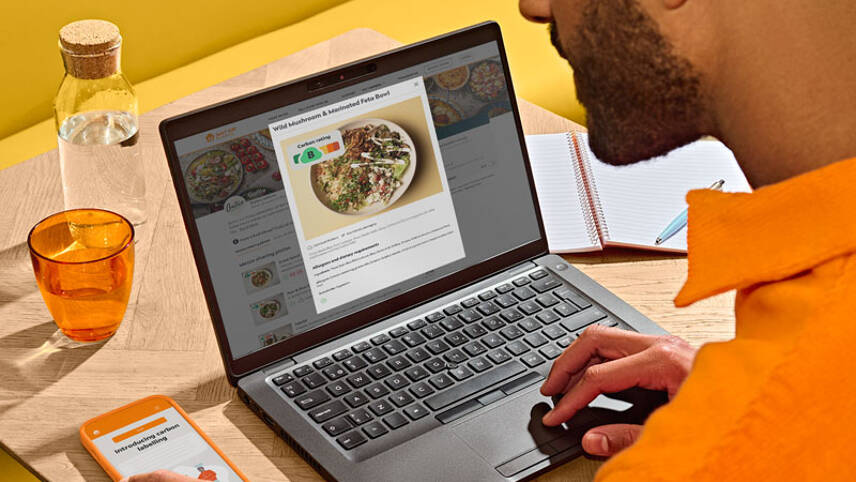Register for free and continue reading
Join our growing army of changemakers and get unlimited access to our premium content

The labels use both grades and a traffic-light colour system
Just Eat for Business has worked with carbon calculations and labelling service provider My Emissions to develop the labels, which use a traffic light and letter-based grading system to communicate the life-cycle carbon impact of each dish.
An ‘A-grade’ dish is very low in terms of carbon impact and will have a green label. At the other end of the scale are ‘E-grade’ dishes, which are the highest in carbon. Labels will be visible digitally during the ordering process and available to customers post-purchase.
Just Eat for Business has funded the trial, meaning there is no additional cost for the 12 participating restaurants – all of which are independent and based in Greater London.
The hope is to increase awareness of the carbon generated through farming, producing, transporting and packaging food. This increased awareness may nudge consumers to choose lower-carbon options more frequently, and could also prompt changes in restaurant menus.
The restaurants taking part are Gallio, Nusa Kitchen, Urban Greens, Mustard Sandwich Bar, Hala Wala, Salad Kitchen, PapaDum, Olive & Squash, Atcha, Choppaluna, Zabardast and K10.
Just Eat notably trialled carbon labels with several restaurant partners in Brighton earlier this year. This initial trial focused on sales made directly to individuals, while the latest phase looks at behaviours with meals in the workplace.
Positive response
Speaking exclusively to edie, JustEatTakeAway.com’s global head of responsible business and sustainability Jaz Rabadia said the extension of the trial to a business setting “is an opportunity for us to create value for our corporate consumers and aid businesses in engaging their employees”.
She said: “We’ve still got a lot of work to do in this area and are only at the very beginning of our carbon labelling journey. We plan to continue gathering data in the next phase of the trial to build on these results and decide the next steps for the future roll-out of carbon labelling on our platform.”
The initial consumer-facing trial in Brighton has now come to an end with any further extension or expansion yet to be confirmed.
Rabadia explained that most Just Eat users “welcomed” the labels during the initial phase of the trial, as it helped them to more accurately make choices aligned with their values on “conscious consumption”.
Feedback from restaurants, meanwhile, was also positive in terms of building knowledge without barriers in terms of costs or existing sustainability-related expertise. Some restaurants, Rabadia confirmed, said they would consider changing recipes to reduce their impact.
Earlier this year, separately, fast-casual Mexican restaurant chain Wahaca removed steak dishes from its menu after completing a carbon labelling exercise. The dishes were proven to be the most carbon-intense items on the menu.
Carbon labelling is currently voluntary in the UK for food firms. However, Chris Skidmore MP’s Net-Zero Review recommends the introduction of standardised environmental labelling on as many product categories as possible by 2025, with food as a priority focus. Skidmore noted that agriculture’s share of UK emissions is set to grow to 30% by 2030 without intervention, including changes to our diets.


Please login or Register to leave a comment.